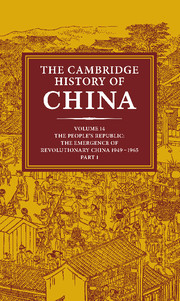Book contents
- Frontmatter
- 1 The reunification of China
- PART 1 EMULATING THE SOVIET MODEL, 1949–1957
- PART II THE SEARCH FOR A CHINESE ROAD, 1958–1965
- Bibliographical Essays
- Bibliographical essays for chapters
- Bibliography
- Appendixes: Meetings and Leaders
- Conversion Tables: pinyin and Wade-Giles
- Glossary Index
- Map 1. China’s physical features
- Map 2. PRC: political (Wade–Giles romanization)
- Map 3. PRC: political (pinyin romanization)
- References
1 - The reunification of China
Published online by Cambridge University Press: 28 March 2008
- Frontmatter
- 1 The reunification of China
- PART 1 EMULATING THE SOVIET MODEL, 1949–1957
- PART II THE SEARCH FOR A CHINESE ROAD, 1958–1965
- Bibliographical Essays
- Bibliographical essays for chapters
- Bibliography
- Appendixes: Meetings and Leaders
- Conversion Tables: pinyin and Wade-Giles
- Glossary Index
- Map 1. China’s physical features
- Map 2. PRC: political (Wade–Giles romanization)
- Map 3. PRC: political (pinyin romanization)
- References
Summary
PHASES OF HISTORICAL UNDERSTANDING
Our comprehension of the great Chinese revolution of modern times has developed through a series of well-marked phases. A brief review of these phases is the best introduction to this volume of The Cambridge History of China, which deals with the first sixteen years of the People's Republic, 1949–65. A brief look at the phases that preceded our present understanding may give the reader a useful perspective on the current state of the art represented in this volume. These phases of understanding may be characterized as missionary, diplomatic, journalistic, and social-scientific.
The missionary phase, inaugurated by the Jesuits and other Catholic missionaries of the sixteenth, seventeenth, and eighteenth centuries, gave us mainly a view of the ancient Chinese classical teachings, the long series of dynasties, and what we may call the myth of the state - the official doctrines of morality and history that emanated from the ruling class and served to indoctrinate both the Chinese masses and people in the West as they gradually heard about China. It was, needless to say, a picture of benevolent government by scholars, in the service of maintaining the family system and the traditional Chinese social order, capped by the office of the emperor.
The diplomatic phase was ushered in by British attempts, beginning in the late eighteenth century, to expand trade with China. The Macartney mission of 1793 and the Amherst embassy of 1816 led eventually to the Opium War of 1839—42, which opened China to foreign contact under the unequal treaty system.
Keywords
- Type
- Chapter
- Information
- The Cambridge History of China , pp. 1 - 48Publisher: Cambridge University PressPrint publication year: 1987
References
- 2
- Cited by

